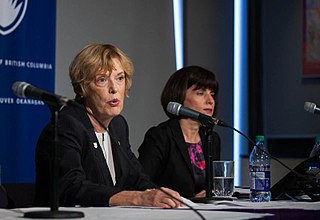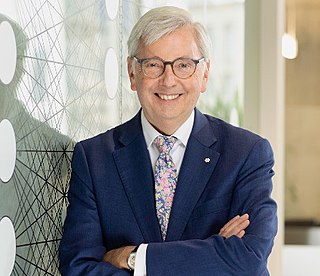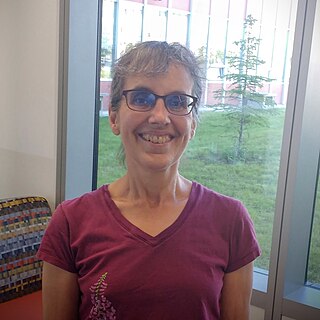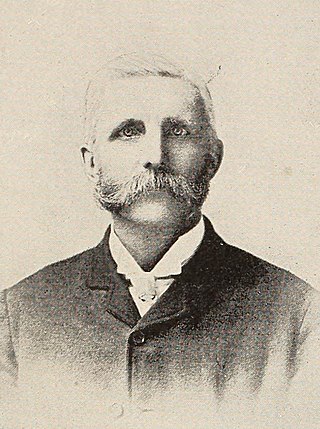
The University of British Columbia (UBC) is a public research university with campuses near Vancouver and Okanagan in British Columbia, Canada. Established in 1908, it is the oldest university in British Columbia. With an annual research budget of $773 million, UBC funds over 10,000 projects a year.
Thomas Edward Siddon, is a Canadian aerospace engineer and politician.
Frank Iacobucci is a former Puisne Justice of the Supreme Court of Canada from 1991 until his retirement from the bench in 2004. He was the first Italian-Canadian, allophone judge on the court. Iacobucci was also the first judge on the Supreme Court to have been born, raised and educated in British Columbia. Iacobucci has had a distinguished career in private practice, academia, the civil service and the judiciary.

Martha C. Piper is a Canadian academic administrator who was the president and vice-chancellor of the University of British Columbia (UBC) from 1997 until 2006. She was the 11th person and the first woman to serve as president of UBC. Having been born in Lorain, Ohio, she is also the first person born outside Canada to have held the position. She is a Canadian citizen and was made an officer of the Order of Canada in 2002. Her contract with UBC stipulated a salary of $350,000 plus incentive payments of up to $50,000 per year upon meeting the performance goals set by the Board of Governors.
J. W. George Ivany was President of the University of Saskatchewan from 1989 to 1999.

Stephen John Toope is a Canadian legal scholar, academic administrator and a scholar specializing in human rights, public international law and international relations. In November 2022, he was appointed as the fifth President and CEO of the Canadian Institute for Advanced Research (CIFAR). Prior to this, he served for five years as the 346th Vice-Chancellor of the University of Cambridge.
The University of British Columbia Library is the library system of the University of British Columbia (UBC). The library is one of the 124 members of the Association of Research Libraries (ARL). In 2017, UBC Library ranked 29th among members of the ARL for the number of volumes in library, making it the third largest Canadian academic library after the University of Toronto and the University of Alberta. However, UBC Library ranked 23rd for the titles held and second in Canada, and had a materials expenditures of $13.8 million, placing it 44th.
Robin Fisher is a Canadian historian known for his book on native relations in British Columbia, Contact and Conflict. Fisher is former provost and vice-president academic of Mount Royal University in Calgary.
The University of British Columbia Okanagan is a satellite campus of the University of British Columbia in Kelowna, British Columbia, Canada.
William Wesley Pue was a Canadian lawyer, academic, and the Nemetz Professor of Legal History at the Peter A. Allard School of Law at the University of British Columbia, Vancouver, British Columbia. He was also a past President of the Canadian Law and Society Association.

H. Michael Stevenson is President Emeritus and Vice-Chancellor of Simon Fraser University. He retired on August 31, 2010, and was succeeded by Andrew Petter on September 1, 2010. Stevenson's appointment as President of Simon Fraser University spanned a decade, the longest term of any president in the history of the university.
Valerie Henitiuk is a scholar researching aspects of the intersection of translation studies, world literature, Inuit literature, Japanese literature, and women's writing. She is a Canadian citizen, recently retired as Vice-president Academic & Provost at Concordia University of Edmonton. Henitiuk has been a visiting scholar at both Harvard and Columbia Universities in the US and at Kokugakuin University in Japan. She was previously executive director of the Centre for the Advancement of Faculty Excellence and Professor of English at Grant MacEwan University in Edmonton, Alberta, on the faculty of the University of East Anglia (UK) and Director of the British Centre for Literary Translation (BCLT).

Keren D. Rice is a Canadian linguist. She is a professor of linguistics and serves as the Director of the Centre for Aboriginal Initiatives at the University of Toronto.
Gavin C. E. Stuart FRCPC is Professor in the Department of Obstetrics and Gynecology, UBC Faculty of Medicine, where he formerly was Dean of Medicine (2003-2015) and Vice-Provost Health (2009-2016).

Humphrey Lloyd Hime was an Irish-Canadian photographer, surveyor, businessman, and politician. He accompanied Henry Youle Hind on his 1858 Assiniboine and Saskatchewan Exploring Expedition, which was meant to assess the viability of settling Western Canada. After the expedition, Hime returned to Toronto and continued to work at the firm Armstrong, Beere and Hime, Civil Engineers Draughtsmen, and Photographists, and eventually held several municipal offices. The firm produced the Armstrong, Beere and Hime panorama in 1857, the earliest known photographs of Toronto.
Benoit-Antoine Bacon is a Canadian neuropsychologist who has been serving as the 17th president of the University of British Columbia since November 2023. He previously served as the 15th president of Carleton University in Ottawa, Ontario from 2018 to 2023.
Margery Fee is a professor emeritus of English at the University of British Columbia (UBC). From 2015 to 2017, Fee was the Brenda and David McLean Chair In Canadian Studies at UBC. She publishes in the fields of Canadian, postcolonial and Indigenous studies and Canadian English usage and lexicography.
Lorraine Janzen Kooistra is a Canadian professor of English and a member of the Yeates School of Graduate Studies at Toronto Metropolitan University. She is the founding co-director of TMU's Centre for Digital Humanities. She was elected a fellow of the Royal Society of Canada in 2018.
Malinda S. Smith is a Canadian political scientist. She is the inaugural Vice-Provost of Diversity, Equity, and Inclusion, an Associate Vice President Research and a full professor of political science at the University of Calgary. Previously, she was a professor of political science at the University of Alberta, where she also held a 2018 Pierre Elliott Trudeau Foundation Fellow and served as a Provost Fellow in Equity, Diversity, and Inclusion Policy in the Office of the Provost. She specializes in equity, social justice, diversity and intersectionality studies, particularly as they are practiced in higher education institutions, as well as in international relations, comparative politics, African security studies and international inequality.
David H. Farrar is an academic and university administrator, serving as the eighth and current President and Vice-Chancellor of McMaster University. Farrar served as professor of chemistry and an academic administrator at the University of Toronto from 1981 to 2007 and the University of British Columbia from 2007 to 2017. From 1 July to 14 August 2016, Farrar briefly served as the interim president of University of British Columbia. In 2017, Farrar joined McMaster University, serving as its Provost and Vice President of Academics, before being named the university's interim president on 1 July 2019 for a one year term. However, in December 2019 McMaster named Farrar as its official president, with his first formal term beginning on 1 July 2020.





